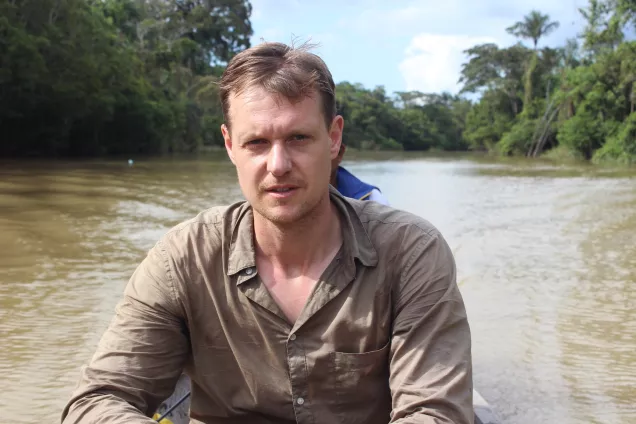What is the project about?
The project EPICC: Environmental Policy Instruments across Commodity Chains - Comparing multi-level governance for Biodiversity Protection and Climate Action in Brazil, Colombia, and Indonesia aims to investigate the global value chains of cattle (meat / leather), gold, tin and palm oil originating in three biodiversity-rich countries (Brazil, Colombia and Indonesia) and imported to the European market. We will apply a multi-level governance and environmental justice approach to the selected commodity chains. By mapping the governance and power links that connect these multiple territories and legal systems with the European market, we seek to identify and analyse leverage points, blind spots and shed light on the micro and macro conditions that may facilitate the mitigation of environmental and social impacts that occur at the selected locations of production (in Brazil, Colombia and Indonesia).
At LUCSUS, we will focus on the value chain for gold and cattle in Colombia.
What sustainability challenges does the project address?
EPICC addresses mainly deforestation and biodiversity loss. Habitat loss is the major driver of biodiversity loss worldwide. and deforestation in the tropics is the second largest source of global greenhouse-gas (GHG) emissions.
These challenges are not only addressed from the producer side ("what can I do to produce sustainably"), but also from the consumer side ("what does my consumption imply in terms of sustainability and how can I lower my impact?").
What excites you about the research?
The sustainability of global value chains (GVC) is a hot topic right now in Europe. It is great to contribute to these debates. The organisation of production in global value chains increases the distance between the locations where final consumption takes place, we observe that consumers, governments and companies based in Europe are increasingly seeking solutions to the environmental and social externalities. This renewed sensitivity has led governments within and outside of the place of origin of the commodities to establish new regulations, but also transnational corporations at all levels of the chains to adopt guidelines and best practices. Furthermore, consumer associations in Europe and around the world have called to boycott products that threaten biodiversity or demand improvements of the chains, for instance greater transparency, better working conditions for local workers and more biodiversity friendly and better environmental practices. Actors located along the chains expect that their interventions will improve the environmental and social performance of agents at the origin of the value-chains. While these interventions are often geographically decoupled from the place of origin of the commodity, they are expected to influence and improve the environmental and social impacts of production processes in countries of origin.
The international dimension of the project is great, to connect discourses on sustainability in different parts of the world.
We are an interdisciplinary team with researchers from Norway, Germany, Belgium, Sweden, Indonesia, Brazil and Colombia. Different knowledge comes together and can co-produce new knowledge while learning a lot of new things from the partners. This is exiting and motivating.
What do you hope to achieve?
It would be an important progress to make the respective value chains more transparent, in terms of actors and governance structures, as well as documenting justice aspects in the value chains.
Due to the pandemic and the political situation in Colombia, field work is difficult right now and requires some creativity. But we hope that during the project we can collaborate closely with key actors such as small producers, workers, companies and governments.
We want to contribute to improving the ecological and social impacts at the selected production sites. In this way, the project makes a significant contribution to answering the question of how to effectively address environmental challenges while ensuring the capacity of local communities to adapt, influence and redirect policy. The project thus also contributes to achieving the goals of the Paris Climate Agreement and the 2030 Agenda for Sustainable Development.
Further, it would be great to contribute to raise awareness among European consumers and decision makers of the different social and ecological sustainability issues the production of globally traded commodities causes.
Who might be able to use the research results?
EPICC brings together multiple stakeholders who are linked by the same value chains but are often invisible to each other. By creating spaces of dialogue, co-creation, mapping and assessment of differential power and relationships, EPICC provides them with the unique opportunity to better understand and visualize the complexity of governance structures, the existence of leverage points and the socioenvironmental implications of their actions/inactions.
Final outputs (policy briefs in local languages) will improve policy discussion around GVC and biodiversity loss/climate change and strengthen the ongoing attempts to govern their complexity.
EPICC will also dialogue with existing policies and conventional frameworks operating at the international level such as the SDGs, in particular SDGs 12, 13, 15, 16; National Biodiversity Strategies and Action Plans (NBSAPs) for Colombia, Indonesia, and Brazil towards achieving the Aichi Biodiversity Targets of the Convention on Biological Diversity (CBD); The Intergovernmental Science-Policy Platform on Biodiversity and Ecosystem Services (IPBES); and the Intergovernmental Forum on Mining, Minerals, Metals and Sustainable Development (IGF).
Therefore, the research results can be useful for policy makers, businesses, and civil society to contribute to achieving the goals of the Paris Climate Agreement and the 2030 Agenda for Sustainable Development; European consumers to get informed and sensitized, and finally for local producers to get visible and get a voice in sustainability issues.


